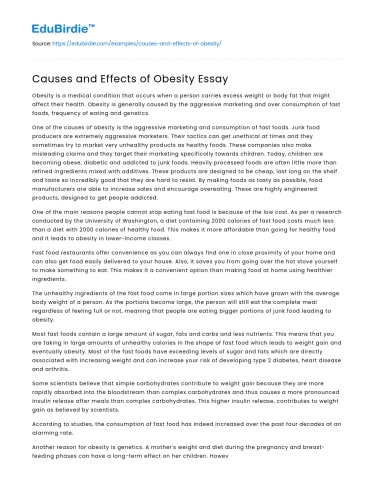Obesity is a medical condition that occurs when a person carries excess weight or body fat that might affect their health. Obesity is generally caused by the aggressive marketing and over consumption of fast foods, frequency of eating and genetics.
One of the causes of obesity is the aggressive marketing and consumption of fast foods. Junk food producers are extremely aggressive marketers. Their tactics can get unethical at times and they sometimes try to market very unhealthy products as healthy foods. These companies also make misleading claims and they target their marketing specifically towards children. Today, children are becoming obese, diabetic and addicted to junk foods. Heavily processed foods are often little more than refined ingredients mixed with additives. These products are designed to be cheap, last long on the shelf and taste so incredibly good that they are hard to resist. By making foods as tasty as possible, food manufacturers are able to increase sales and encourage overeating. These are highly engineered products, designed to get people addicted.
Save your time!
We can take care of your essay
- Proper editing and formatting
- Free revision, title page, and bibliography
- Flexible prices and money-back guarantee
One of the main reasons people cannot stop eating fast food is because of the low cost. As per a research conducted by the University of Washington, a diet containing 2000 calories of fast food costs much less than a diet with 2000 calories of healthy food. This makes it more affordable than going for healthy food and it leads to obesity in lower-income classes.
Fast food restaurants offer convenience as you can always find one in close proximity of your home and can also get food easily delivered to your house. Also, it saves you from going over the hot stove yourself to make something to eat. This makes it a convenient option than making food at home using healthier ingredients.
The unhealthy ingredients of the fast food come in large portion sizes which have grown with the average body weight of a person. As the portions become large, the person will still eat the complete meal regardless of feeling full or not, meaning that people are eating bigger portions of junk food leading to obesity.
Most fast foods contain a large amount of sugar, fats and carbs and less nutrients. This means that you are taking in large amounts of unhealthy calories in the shape of fast food which leads to weight gain and eventually obesity. Most of the fast foods have exceeding levels of sugar and fats which are directly associated with increasing weight and can increase your risk of developing type 2 diabetes, heart disease and arthritis.
Some scientists believe that simple carbohydrates contribute to weight gain because they are more rapidly absorbed into the bloodstream than complex carbohydrates and thus causes a more pronounced insulin release after meals than complex carbohydrates. This higher insulin release, contributes to weight gain as believed by scientists.
According to studies, the consumption of fast food has indeed increased over the past four decades at an alarming rate.
Another reason for obesity is genetics. A mother's weight and diet during the pregnancy and breast-feeding phases can have a long-term effect on her children. However, fathers are not without blame. Epigenetic changes are passed on in sperm and carry with them a significant risk of developing obesity. Obesity has strong genetic components, meaning that children of obese parents are much more likely to become obese than children of lean parents. This doesn’t mean that obesity is predetermined. What you eat can have a major effect on which genes are expressed and which are not. Put simply, genetic components do affect your susceptibility to gaining weight. According to obesitymedicine.org, people who have obesity have multiple genes that expose them to gain excess weight. One such gene is the fat mass and obesity-associated gene (FTO), which is found in up to 43% of the population. In the presence of readily accessible food, those with the fat mass and obesity-associated gene may have challenges limiting their caloric intake. The gene and other related genes can cause increased hunger levels, increased caloric intake, reduced satiety, reduced control over eating, and increased tendency to store body fat. Genetics also affect hormones involved in fat regulation. For example, one genetic cause of obesity is leptin deficiency. Leptin is a hormone produced in fat cells and in the placenta. Leptin controls weight by signaling the brain to eat less when body fat stores are too high. If, for some reason, the body cannot produce enough leptin or leptin cannot signal the brain to eat less, the control is lost, and obesity occurs.
To top it all off, the frequency of eating also results in obesity. The relationship between how often you eat and weight is somewhat controversial. Reports show that overweight people eat less often than people with normal weight. People who eat small meals four or five times daily, have lower cholesterol levels and lower and/or more stable blood sugar levels than people who eat two or three large meals daily. One possible explanation is that small frequent meals produce stable insulin levels, whereas large meals cause large spikes of insulin after meals.
To conclude, obesity is in fact caused by the aggressive marketing of fast foods genes, and frequency of eating. It is important to take steps I prevent obesity because it can lead to a number of life-threatening conditions These include type two diabetes, coronary heart disease, stroke and breast and bowel cancer.






 Stuck on your essay?
Stuck on your essay?

